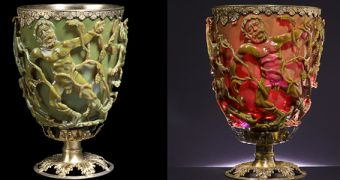A 1,600-year-old Roman goblet that is now on display at The British Museum in London can change color depending on whether it is lit from the front or from behind.
More precisely, the goblet looks jade green whenever light hits its front. When the goblet is lit from behind, its color changes to bright red.
According to Daily Mail, it took researchers several decades to figure out why the ancient Roman goblet behaves in this uncanny manner.
Thus, the goblet was brought to The British Museum in the 1950s. However, researchers only managed to solve the mystery surrounding it in the 1990s.
It turns out the explanation is that, unlike other relics dating back to Roman time, this chalice is impregnated with loads of silver and gold nanoparticles.
The particles reportedly measure an average of 50 nanometres in diameter, which means that they are about a thousand times smaller than a run-off-the-mill grain of salt.
Scientists say that, when the chalice is hit by light, the electrons that make up these metal nanoparticles vibrate in distinct and precise ways.
This is what causes to chalice to chance color, depending on where the viewer and the light source are positioned.
Odds are that, when filled with various liquids, the goblet changed its color depending to their densities and properties.
Specialists now argue that, since it is more than obvious that whomever made this goblet knew exactly what they were doing and purposely impregnated it with silver and gold nanoparticles, it can be argued that the Romans were pioneers of nanotechnology.
“The Romans knew how to make and use nanoparticles for beautiful art,” specialist Gang Logan Liu at the Illinois at Urbana-Champaign told the publication.
Historians explain that this peculiar goblet depicts a scene involving King Lycurgus of Thrace, who is pictured entangled in grapevines.
Many suspect the King is being punished for having done something to upset Dionysus, the Greek god of wine.

 14 DAY TRIAL //
14 DAY TRIAL //